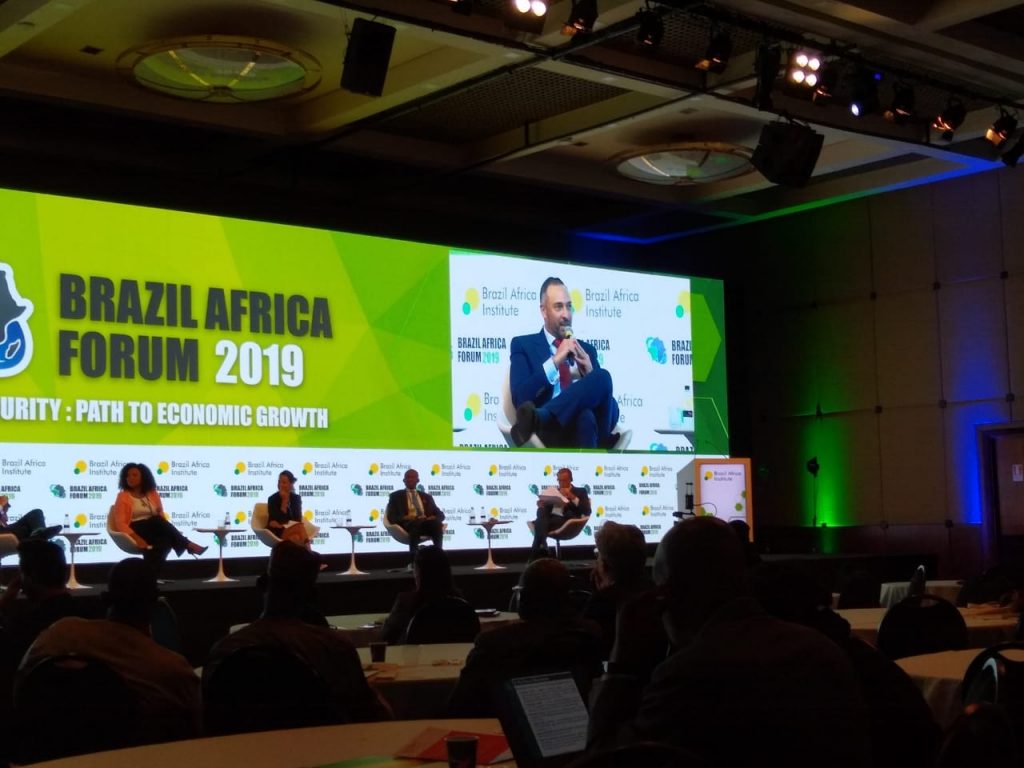São Paulo – Although it’s striving to develop through agriculture, Africa is faced with obstacles, like difficulties in building cooperation efforts and financing to smallholder farmers, who account for the bulk of crops across the continent. Specialists flocked to Sheraton WTC, São Paulo to discuss the subject this Wednesday (13), the second day of the Brazil Africa Forum. Panels covered some of the options on the table for agriculture in the continent, including ones involving Brazilian participation.
Several speakers argued that agriculture could be an avenue to the economic development of the African continent. Arab Brazilian Chamber of Commerce secretary-general Tamer Mansour (pictured above) sat on the second panel of the day, on the international agricultural trade scenario, and said food is very important to Brazil-Africa relations. Some of the countries in Africa are Arab, and Brazil is one of the biggest suppliers of food products to the region.

According to chief economist and director of the Research and International Cooperation Department at the African Export-Import Bank (Afreximbank), Hippolyte Fofack, 75% of Africa’s imports of food and agricultural products hail from Brazil. The Cairo, Egypt-based Afreximbank is a finance institution established by the African Development Bank (AfDB). Fofack believes Brazil can cooperate with Africa in food processing and renewable energy.
The specialists in the panels all agree that Brazil and Africa can work together in more than just trade. Mansour said the Arab Chamber works to extend Brazilian-Arab relations beyond imports and exports. He advocated creating three-pronged agricultural projects involving Brazil, the Arab countries of the Gulf, and Africa. In order for this to work, Mansour believes it is important for countries to enter into agreements concerning trade, double taxation, and investment facilitation.
International Trade Centre (ITC) manager Fernanda Leite questioned Brazil’s absence from African agriculture, and said China and India are firmly rooted in the continent. “What about Brazil, where is it?,” she inquired. Leite stressed the importance of creating the conditions for small and medium businesses to go international, including to Africa, since they are the biggest job and income generators in the world. The ITC manager said one of the problems faced by smaller enterprises when it comes to entering new markets is lack of information.
Instituto Brasil-África research economist Igor Lucena said Brazil grew into an agricultural powerhouse in the last 100 years, and the same will happen with Africa eventually. Hippolyte of Afreximbank is also a believer in the potential of African agriculture. “Africa will not join global trade unless it develops its agriculture.”
Development Impact Manager and Advisors (DIMA) founder and CEO Luana Ozemela discussed the experience of Qatar, which, like most African nations struggle with adverse weather when it comes to farming. Even though DIMA is based in Qatar, Ozemela was born in Brazil. She said the economic embargo boosted farming in Qatar, by forcing it to strive for self-sufficiency in food supplies. “The country is becoming green, in the middle of the desert,” she said.
Financing

One of the topics of the first panel of the day was financing agriculture in Africa. According to specialists, one of issues in accessing resources is the fact that many of the rural properties are unregistered, and banks require warranties in order to supply credit. Fayçal Benameuri, the senior VP for East Africa with Morocco’s phosphate manufacturer the OCP Group, said that the lack of financing and resources keeps yields from improving.
Standard Bank CEO Natalia Dias discussed the experience of the South Africa-based institution. Here, financing is done with involvement from major export-import companies, which sell the smallholder crops. Those major companies also oversee the crops, as does the bank, in tandem with other foreign companies.
The key topic of the Brazil Africa Forum was food security. The two-day event spanned Tuesday and Wednesday and was attended by Brazil’s vice president Hamilton Mourão on its opening day. Attending authorities also included Nigeria Agriculture and Rural Development minister Alhaji Sabo Nanono. The forum was held by the Brazil Africa Institute.
Translated by Gabriel Pomerancblum




